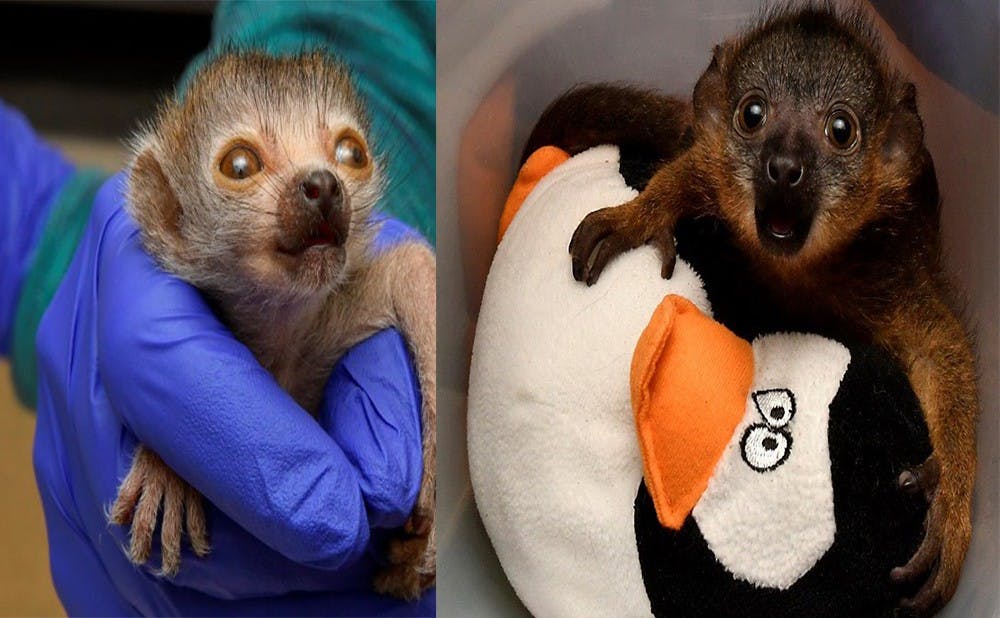Duke's official mascot may be the blue devil, but the lemur is making a strong case for the University's unofficial symbol.
The Duke Lemur Center recently welcomed its second and third lemurs of the spring with the recent births of Nedjem, a male crowned lemur, and Céline, a female collared lemur. Céline’s April 24 birth marked the third for the center since February, when Marie, a Coquerel's sifaka, was born Feb. 23.
The Duke Lemur Center houses roughly 240 lemurs—the largest collection of the animals outside of Madagascar. The organization uses conservation breeding to protect many endangered species.
A ‘sweetie’ is born
After his April 13 birth, Nedjem was given his Egyptian name, like all crowned lemurs at the lemur center. His name means "sweetie." Nedjem was also the name of an ancient Egyptian cat—the first cat in recorded history to be named.
Nedjem checked in at just under 57 grams at birth, slightly less than a tennis ball. Only 1,000 to 10,000 of these endangered lemurs are estimated to live in the wild.
His mother, Sanura—which means “kitten”—was tender with her newborn son after his birth.
“Momma helped her baby along by gently pulling his head with her mouth, delivering the baby within a minute or two and calmly sitting and grooming him inside her basket,” a release on Nedjem’s birth stated. “The infant’s eyes were open and he opened its mouth and flicked his tongue as Sanura groomed his face.”
Male and female crowned lemurs look different, as females are gray with orange "crowns" whereas males are dark red and brown with orange and black crowns. Crowned lemurs tend to eat mostly fruit and live in dry forests. The lemurs travel in groups of five to 15 and break into smaller groups to look for food.
They have a very small natural habitat remaining—just the northern end of Madagascar. The area is about 500 square miles, or roughly the size of Los Angeles. The lemurs are threatened by certain types of farming and hunting, despite four reserves in the island nation designed to protect them.
“Like most lemur species there is a strong need for biological surveys to be undertaken to determine this lemur’s distribution, and for more reserves to be created,” the lemur center’s website says.
‘Heavenly’ collared lemur born
The Lemur Center’s now-youngest lemur shares her name with pop icon Céline Dion.
Céline, an endangered collared lemur, received a French name like all collared lemurs at the Duke Lemur Center. The name is French for “heavenly,” and Céline Dion is also one of her primary keeper’s favorite artists.
The young lemur recently reached a milestone.
“Baby Céline was seen climbing from mom Bijou’s belly onto her back for the first time, and although she hasn’t tasted it for herself yet, she’s seemed interested in the solid food her momma is eating,” a Duke Lemur Center Facebook post reads.
Céline may be small now, but collared lemurs grow to roughly the size of a cat when they reach adulthood. Collared lemurs generally eat fruit, leaves and flowers.
They live in groups of generally between three and 12.
Collared lemurs are endangered largely due to hunting, being captured as pets and burning trees to make charcoal. The Duke Lemur Center is attempting to help Madagascar cut back on its use of the fuel by distributing stoves that use less charcoal.
“The stoves, in addition to being more fuel efficient, improve women’s and children’s respiratory health through improved kitchen air quality,” the Duke Lemur Center’s website reads.
Get The Chronicle straight to your inbox
Signup for our weekly newsletter. Cancel at any time.

Managing Editor 2018-19, 2019-2020 Features & Investigations Editor
A member of the class of 2020 hailing from San Mateo, Calif., Ben is The Chronicle's Towerview Editor and Investigations Editor. Outside of the Chronicle, he is a public policy major working towards a journalism certificate, has interned at the Tampa Bay Times and NBC News and frequents Pitchforks.

